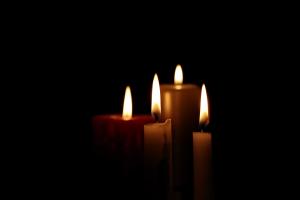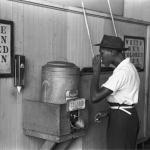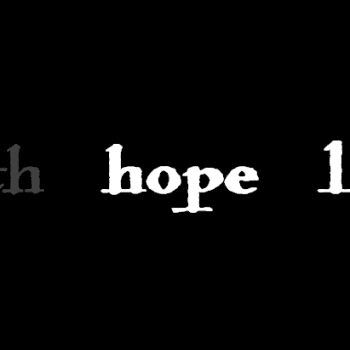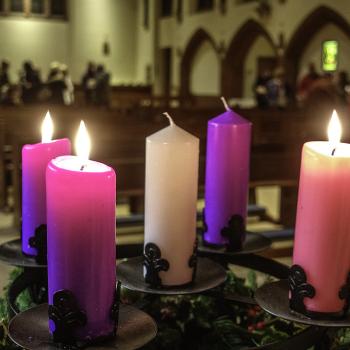Yesterday—the Saturday before the first Sunday of Advent—I read a poem by Nikki Giovanni, and it helped me make sense of my experience in worship this morning, reminded me why during Advent, when so many are already knee deep in tinsel and cheer, the physical sensations of sadness tingle across my chest and down my arms more often than usual.
My two youngest kids and I hurried out of the house this morning, leaving my wife and oldest child behind while he looked in the dryer for a shirt to wear. Normally I would wait, but this morning I suspected the opening hymn would be “Come, Thou Long-Expected Jesus,” one of my favorites. I get at most a couple of chances to sing it each year; I wasn’t going to miss my first.
The kids and I made it to our pew in time, my seat on the end in just the right spot for the sun, shining through the clear glass window, to blind me for a few minutes. The organ began the opening strains, signaling the congregation to stand. Everyone else fumbled to find the page in the hymnal, but my hymnal sat neglected on the pew. I knew this one.
Come, thou long-expected Jesus, born to set thy people free;
from our fears and sins release us, let us find our rest in thee.
I didn’t get further than that, didn’t get to finish even the first verse, before my voice caught as sorrow rose in my throat. My eight-year-old looked up at me when she heard my booming baritone go silent and watched me mouthing the words.
The sanctuary looked gorgeous—a floor-to-ceiling Chrismon tree, a simple Advent wreath, a choir twice its usual size. But I couldn’t meditate on the hope of Advent—that the Christ who came, the Christ of Mary and the manger and the wise men, would return in glory to finish the liberation, to make all things new. I was too overcome with the other side of that truth: We are not yet free—I am not yet free; I’m not released from my fears. And there’s no good reason to think I will be any time soon.
I thought of the week before Thanksgiving, when my wife was out of town. I stayed home most days to write while the kids were in school, rather than working at the seminary where I teach. The first two days—O, so productive! I met writing goals and sold an article, even while loneliness and a sense of inadequacy—these familiar ghosts of ages past, happily distant of late—began stalking the edges of my awareness.
Until Wednesday, day three, when they walked right through the door, rattling their chains, telling me again what I used to believe was true: You are a worthless nobody. You thought you would be somebody by now, amount to something, but look at you sitting alone in the middle of the day in your fleece pajama pants and holey undershirt, pretending you are a writer.
And look how you try to wake early in the morning to pray, pretending you are a Christian. Hah!
And then these twin ghosts of loneliness and inadequacy sat on my chest and wouldn’t let me get out of the La-Z-Boy.
Until I heard another voice from the kitchen, just loud enough to distract me from these demoralizing mantras. Two days earlier I’d taken my fourteen year-old shopping for his birthday party, scheduled for Saturday. The larger-than-party size bag of Doritos sat in a shopping basket on the kitchen floor.
And it whispered my name.
Momentarily free, I sprang into the kitchen, ripped open the bag and ate just enough handfuls to help me forget the pair in the other room. After finishing, I hid the open bag so the kids wouldn’t find it.
The Doritos and I met like this every morning and afternoon for the next couple of days.
Friday morning, I stood in my pajamas in the kitchen, mining the bag of Doritos for the sixth time, thinking, I don’t even want to eat these, and yet I couldn’t stop. I had to leave the house in thirty minutes to have lunch at the middle school with my son. And yet: shovel, crunch, shovel, crunch, as I stared blankly out the window, through the denuded fall trees, across the Allegheny River, to the hills on the other side and the gray, sad horizon beyond.
Then the Doritos were gone. I shoved the empty bag in the trash, covered it with paper towels, and got in the shower.
Born to set thy people free, everyone was singing around me, but I knew better: not me, not yet.
***
Not any of us, really, if we’re honest. We are not free from our own fears and sins, or from the fears and sins of others.
The poor are not free from the fear of tomorrow, or from the greed of the oligarchs, who just got the U.S. Congress to vote on a tax plan that sends more of the poor’s money their way.
And we are not free from the corruptions of race, the stories lighter skinned people have told and believed and used to control the bodies of darker skinned people for their social and economic advantage.
And free from fear? When one of the greedy, unstable oligarchs possesses the codes to the U.S. nuclear arsenal, and seems too eager to use these weapons against another unstable leader’s regime and people across the sea?
I began to wonder why I was the only one who couldn’t sing for sorrow, the only one who seemed to recognize these realities, who could see the shadow side of Advent.
Advent can have a salutary effect if it lets us investigate this flipside. It can give us space to examine the truth of our lives, and to weep for the many ways we are still unfree, haunted by our fears, real and imagined, individually and corporately.
But too often the preacher’s favorite theme in Advent is Hope (I’ve preached enough in Advent myself to know this). Preachers like to take their cue from Julian of Norwich, and announce confidently the Advent Gospel: All shall be well, and all manner of things shall be well!
But probably not tomorrow, or the day after that. And likely not next year, or in the foreseeable future.
And we need to say that, too.
***
And all of that is what Nikki Giovanni’s poem, which I read yesterday, primed me to consider as I sang in worship this morning. In the poem, “Baby West”—from her recent collection, A Good Cry—the narrator is learning to cry over the repressed memory of her father’s beating her mother when she was a child. It’s an invitation to herself, and to others, to learn to cry; it gives permission to weep.
We always teach
The youngsters
Don’t cry it will be
All right
(Nikki Giovanni’s paraphrase of the typical Advent message, perhaps?)
She continues:
But crying cleanses.
It will not be
All right
I’d love to learn again how to say with confidence in Advent, and every season after, All shall be well, and all manner of things shall be well, to feel in my bones this promise of Advent. But as my heart still hears the refrains of those unfriendly ghosts and the crinkle of the hidden Dorito’s bag expanding in the trash and the cries of those bound by the related systems of class and race—which is all of us—I don’t think I’ll be able to.
Until I can learn to speak and grieve, for myself and maybe for church and the world, this other Advent truth:
It will not be all right.
*****
L. Roger Owens teaches spirituality and ministry at Pittsburgh Theological Seminary. He’s written two books on the spiritual life, Abba, Give Me a Word: The Path of Spiritual Direction and What We Need Is Here: Practicing the Heart of Christian Spirituality.













